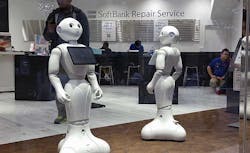Smart Things Everywhere: The Connected Future of 2025
By the year 2025, IDC estimates that the average person will interact with connected devices nearly 4,800 times per day – one interaction every 18 seconds.
Each interaction will add to a global datasphere that will grow to 163 zettabytes (that is a trillion gigabytes), or more than 10 times the 16 ZBs of data generated in 2016. That’s just seven years in the future.
By 2025, “smart” will become the new normal. In the age of smart devices and applications, interactions with data will become a part of everyday life. Many of these interactions will involve cognitive systems that interact with the data that we generate, creating new layers of data analysis across a range of industries, applications, and scenarios. IDC estimates that the volume of analyzed data that is “touched” by cognitive systems will grow by a factor of 100 to 1.4 zettabytes in 2025.
The IDC report offers one window on our connected future, and how it will change our economy and the data center industry, The ultimate impact of this explosion in data interactions will be profound, and lead to changes in society and in the fabric and even quality of the average person’s daily stream of life. Connected homes, cars with autonomous driving capabilities, and intelligent wearable devices will enter everyday usage. We will never stop creating data, and the value of this data will grow and support the systems we’ve grown to rely on.
That includes the data centers and cloud systems housing the IT that stores and manages this data, along with the servers that provide the data-crunching horsepower to infuse intelligence into devices and processes.
Cognitive Systems Will Be Everywhere
If you own a Google Home or an Amazon Alexa, you’re already a part of this revolution. Every question you ask Alexa helps teach a learning engine how to understand you more effectively. It then applies this data across vast data repositories (big data, data lakes, data warehouses) to better correlate this information and find complex patterns on to serve you more efficiently.
And, also, to collect your data. But we’ll get to data privacy in a minute.
In my current role, I get chance to work with advanced cloud solutions creating services using AI, machine learning, and even solutions like speech processing APIs. I’ve also begun to see how these types of solutions are being integrated with business systems and consumer products. enables a new set of technologies such as machine learning, natural language processing, and artificial intelligence — collectively known as cognitive systems — to turn data analysis from an uncommon and retrospective practice into a proactive driver of strategic decision and action.
Data Will Fuel the Cognitive Engine
Cognitive systems thrive on data. And the more data, the better. According to IDC, by 2025, two-thirds of global financial firms will integrate cognitive data from third parties to improve the customer experience through targeted product and service offerings and fraud protection. Applications for these cognitive systems touch a large surface of our business and personal lives.
Here’s another example: driverless cars, seen already on some city streets, rely on real-time telemetry and machine learning to “learn” how to drive. Advances in these underlying cognitive systems will shorten the time needed to teach driverless cars how to handle new scenarios.
The same goes for working with learning engines like Alexa and even Google Home. The more you interact with them, the better they learn and support you. In 2025 and beyond, data will become the fuel for almost all of the personalized services and cognitive systems that we interact with.
Data Privacy Will Have Greater Gravity
A recent Wired article illustrated smart device privacy by posing this thought:
“Say you’re meeting with your attorney, confess you’ve had an affair with a woman named Alexa, and happen to say the trigger phrase (after all, more than 100,000 people born in the past 25 years were given that name). Who has access to that recording? Or what if, in a meeting, someone triggers the device to record the conversation without your permission? This would be legal, if unethical, in so-called one-party consent states (California requires permission from both parties before recording).”
The Amazon Echo Show brings video to any surface in a home. (Photo: Amazon)
To that same extent, do you give informed consent to being recorded every time you enter a home with a Google Home or Alexa device? As these cognitive systems become a part of our lives, data privacy will need to be redefined. What if police demand the recordings of your Alexa device from Amazon like in a recent murder case? Amazon protested but then ended up handing over the recordings after the defendant allowed police to review the data as it actually helped his case towards innocence. When police initially handed Amazon a warrant for the data, they responded with:
“Given the important First Amendment and privacy implications at stake, the warrant should be quashed unless the Court finds that the State has met its heightened burden for compelled production of such material.”
But will all companies fight for your data rights? Google’s privacy policy, for example, states:
“We will share personal information outside of Google if we have a good-faith belief that access, use, preservation, or disclosure of the information is reasonably necessary to:
- Meet any applicable law, regulation, legal process, or enforceable governmental request. We share information about the number and type of requests we receive from governments in our Transparency Report.
- Enforce applicable Terms of Service, including investigation of potential violations.
- Detect, prevent, or otherwise address fraud, security, or technical issues.
- Protect against harm to the rights, property or safety of Google, our users, or the public as required or permitted by law.
Basically, with Google, there may very well be a situation where they won’t ask your permission to share data, including voice recordings.
Security Practices Reflect The Value of Data
Working with data privacy is going to be a real challenge. If you saw how Facebook treated user data when it came to the Cambridge Analytics scandal, I’m sure you’re pretty nervous. Your data will only become more valuable. However, these public instances of data misuse will hopefully entice companies to treat data more carefully. Even though data privacy is important, your trust is even more critical. Brands will need to be much more aware and cautious in how data is treated, secured, and shared.
The future is shaping up as a truly fascinating place. IDC predicts that as data becomes more critical, the entities that manage and store it will need to develop measured approaches to increasing reliability, lowering latency, and increasing security. The projected 163 ZB datasphere of 2025 is only the beginning to our society’s data-drive journey. Much like the industrial revolution, we are now confronting a technological evolutionary point – the Age of Data.
As smart becomes the new normal, my biggest recommendation is to always remain aware about the data you’re generating. Constant vigilance will help you stay more secure. With so many data-drive devices in our lives, it may truly become challenging to know who, or even what, might be listening. So, it’s important to leverage these tools effectively, while doing our best to stay aware of privacy and security.
About the Author


